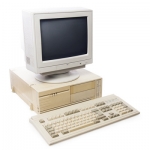NetWorthy Systems Blog
Was my Computer Always this Slow?
We think this is something everybody can relate to. That computer or laptop that you bought a few years ago seemed very fast and capable when it was first set up, but these days it doesn't seem to have the same get-up-and-go. Why does performance degrade as time goes by?
We are using the term 'old' pretty loosely, don't you think? After all, a computer is considered old after 3-5 years, depending on how good it was in the first place and how well it is taken care of. Technology simply depreciates quickly - new hardware and software is coming out all the time. Combine that with innovations in hardware manufacturing and demand, which leads to better prices for better technology, and you've got an industry that flies forward without looking back.
So why is that once reliable 5-year-old workstation feeling so sluggish lately? Is it the manufacturer's diabolical agenda to plant a doom-seed in every piece of electronics to ensure it dies right after the warranty? There are actually a few reasons why your computer is running slow.
Your computer is unorganized- When you first bought your computer, it wasn't running a lot of software. It didn't have as many files on it either. As a computer's hard drive fills up, it can get fragmented, which is the computer equivalent of a disorganized file cabinet. All of that data that you have saved, deleted, and edited over the years has left the surface of the hard drive cluttered with tiny pieces of files. To pull up a word document means the disk needs to work hard to find every piece to it, which could be scattered all over. Running disk defragment will resolve this and might speed things up slightly.
Your computer is overloaded - Since you purchased your computer, you've installed plenty of applications, updated software configurations, updated programs, and applied security patches to your operating system. None of that is supposed to degrade performance but over time, it can give your computer more to think about and more to process, which can cause it to take longer when performing standard operations.
Your computer hasn't been maintained - On the flip side, not installing updates for software and your operating system can cause security issues and lead to even more problems. Malware infections, spyware, massive amounts of temporary files, and other issues can take a huge toll on how stable and fast your computer is. If your PC isn't being properly taken care of regularly, these issues are going to add up. Regular monthly maintenance is the best way to go, and it's much more cost effective than dealing with problems that have piled up due to lack of maintenance.
Your computer is stumbling over the new stuff - Your hardware was built specifically for a certain OS, and certain software was written to run on it. That doesn't mean that new software doesn't work on it - in many situations (not all) it does. However, modern software takes advantage of modern hardware. New operating systems run better on new PCs and old software might not run as well on newer operating systems, and so forth. When everything is kept up to date equally, you'll see the best results.
It's all your perception - That's right; sometimes it's just in your head. If your computer is being taken care of by a professional IT firm like NetWorthy Systems, it could be getting a little slower, but usually it's because you are comparing it with a new computer. This happens all the time and most people don't realize it; if you get a brand new computer at home and go into the office and use a 3-year-old machine that has been chugging along without a hitch all this time, your work computer will seem slow. New technology is getting faster and more efficient (not to mention cost-effective).
Is your workstation running slower than you think it should? Contact us at NetWorthy Systems to talk about how proactive maintenance can improve the performance of your network and keep you from spending too much time waiting for your technology to react to your needs.
